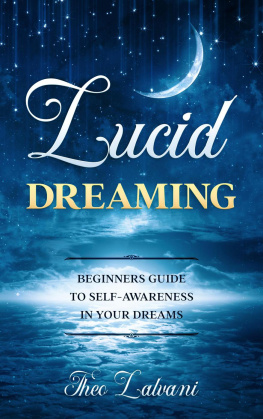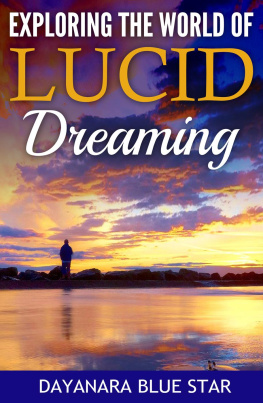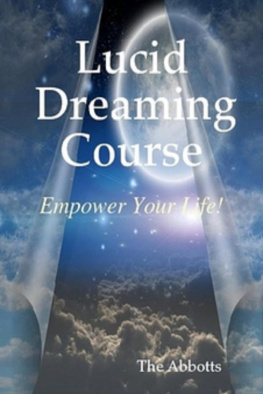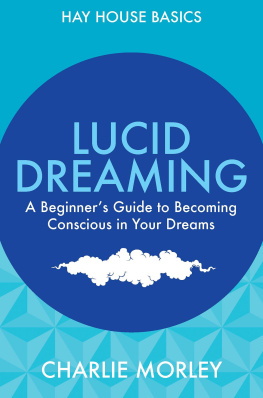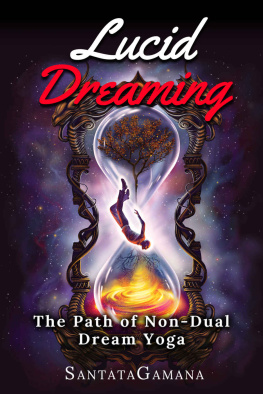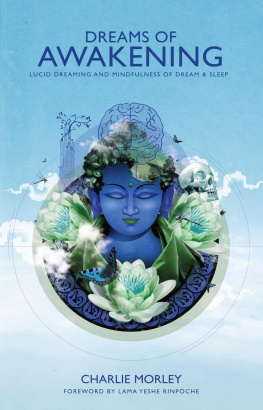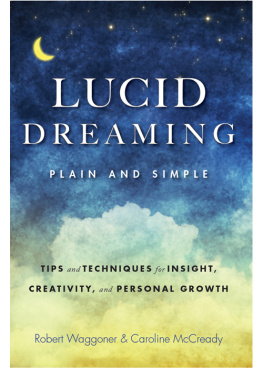Lucid Dreaming
New Perspectives on Consciousness in Sleep
Ryan Hurd
Kelly Bulkeley
Jorge Conesa-Sevilla
Daniel Erlacher
Jayne Gackenbach
Brigitte Holzinger
David J. Hufford
Harry T. Hunt
Lee Irwin
Stephen Laberge
James F. Pagel
Tim Post
G. Scott Sparrow
Tadas Stumbrys
Isaac Y. Taitz
Georg Voss
Ursula Voss
Robert Waggoner
Mary Ziemer

Copyright 2014 by Ryan Hurd and Kelly Bulkeley
All rights reserved. No part of this publication may be reproduced, stored in a retrieval system, or transmitted, in any form or by any means, electronic, mechanical, photocopying, recording, or otherwise, except for the inclusion of brief quotations in a review, without prior permission in writing from the publisher.
Library of Congress Cataloging-in-Publication Data
Lucid dreaming : new perspectives on consciousness in sleep / Ryan Hurd and Kelly Bulkeley, editors ; foreword by Stephen LaBerge.
volumes cm. (Practical and applied psychology)
Includes bibliographical references and index.
Contents: volume 1. Science, psychology, and education volume 2. Religion, creativity, and culture.
ISBN 9781440829475 (hardback) ISBN 9781440829482 (ebook) 1. Lucid dreams. 2. Consciousness. 3. Dreams. 4. Sleep. I. Hurd, Ryan, 1975 II. Bulkeley, Kelly, 1962
BF1099.L82L83 2014
154.63dc23 2014000576
ISBN: 9781440829475
EISBN: 9781440829482
18 17 16 15 14 1 2 3 4 5
This book is also available on the World Wide Web as an eBook.
Visit www.abc-clio.com for details.
Praeger
An Imprint of ABC-CLIO, LLC
ABC-CLIO, LLC
130 Cremona Drive, P.O. Box 1911
Santa Barbara, California 93116-1911
This book is printed on acid-free paper 
Manufactured in the United States of America
Recent Titles in Practical and Applied Psychology
Meta-Physician on Call for Better Health: Metaphysics and Medicine for Mind, Body, and Spirit
Steven E. Hodes, M.D.
The Powerful Bond between People and Pets: Our Boundless Connections to Companion Animals
P. Elizabeth Anderson
Sexual Enslavement of Girls and Women Worldwide
Andrea Parrot and Nina Cummings
The Global Muslim Community at a Crossroads: Understanding Religious Beliefs, Practices, and Infighting to End the Conflict
Abdul Basit, Editor
Living in an Environmentally Traumatized World: Healing Ourselves and Our Planet
Darlyne G. Nemeth, Robert B. Hamilton, and Judy Kuriansky, Editors
The Psychology of Black Boys and Adolescents
Kirkland Vaughans and Warren Spielberg, Editors
Contents
Acknowledgments
We are deeply thankful for the dream research community for their inspiration and guidance while hatching the plan for this project. We are in particular indebted to the work of lucid dreaming pioneers whose groundbreaking research and scholarly publications in the 1980s are responsible for there even being a field of lucid dreaming research. Of course, we thank all the contributors to this volume, who not only provided new and insightful work, but also entered into deep conversation with us about the scientific, spiritual and artistic frontiers of this topic and the larger questions that naturally emerge from the dialogue. The members of the International Association for the Study of Dreams (IASD) have been early audiences and friendly critics of many of the ideas shared in this book, and their insights have helped make everyones work sharper, clearer, and better connected to broader issues of public interest.
We are also grateful for the following artists who have contributed original art in this collection: Fariba Bogzaran, Clare Johnson, and Diana Riboli. We would like to thank Laura Atkinson for her personal assistance with the graphic design of these original pieces.
From Ryan Hurd:
Thanks to Jack Hunter, Charlie Laughlin and Stephen LaBerge for providing timely encouragement and peer review for the earlier drafts of my own chapter in this manuscript. I am also appreciative of the Rose family in Bryn Athyn, Pennsylvania, for their support with babysitting during crucial times, especially Monica and Teryn Rose. And, of course, this project could not have been completed without the unfailing support of Wendy.
From Kelly Bulkeley:
My heartfelt appreciation goes to the family and friends whose encouragement is the wind that keeps me aloft: to Hilary, Dylan, Maya, Conor, Levi, Strauss, and all the rest, many thanks.
Foreword
In the course of everyday life, we rarely reflect on our global reality orientation and state of consciousness. While awake we may assume that we are awake, but this is more a tacit acceptance of the default assumption of real until proven otherwise. As Harvard philosopher and founder of American psychology William James perspicuously observed, everything we experience seems real, and for us, is real, until we have some other contradictory experience that forces us to test and choose among our conflicting experiences. Which are more, and which are less, coherent in terms of what else we know (or think we do) about the world? Thus we must choose what to keep, and what to discard as unreal.
Likewise, while dreaming, we do not usually notice that we are dreaming. However, there is a significant exception to this: During what are usually called lucid dreams, we take explicit note, or cognizance, of the fact that we are dreaming. This means that not only do we know we are dreaming, but also that we know that we know it. This reflection on our state of consciousness typically comes about, analogously as it does in waking life, when experiential anomalies occur giving rise to the question of how to resolve contradictory evidence. For example, suppose I am talking to Aristotle (according to the testimony of my senses), yet I know Aristotle is many centuries dead. I may decide that the philosopher is only a ghost, or lives on in his books, or is an Aristotle-impersonator (You know, like an Elvis-impersonator), etc., and continue to dream non-lucidly. Or I may realize that the correct explanation of the Anomalous Aristotle is that I am now dreaming. This thought may be in passing and forgotten in a moment, or, by a process of resonant conscious reflection, may lead to a sustained lucid dream lasting many minutes in which metaconsciousness of dreaming is retained while the lucid dream lasts.
During such cognizant dreams, experience and experiments show that to a much greater extent than previously thought, expert dreamers can reason rationally, remember the conditions of waking life, and act voluntarily within the dream upon reflection or in accordance with plans decided upon before sleepall while remaining soundly asleep, vividly experiencing a dream world that can appear astonishingly real.
The foregoing is generally how lucid dreaming appeared then and now to people who have experienced it for themselves. Not so for almost all of the experts, that is, those who hadnt experienced the state themselves. Thus, until very recently, most sleep and dream researchers regarded lucid dreaming as no more than a curiosity: at best a metaphorical unicorn, rare to the point of being mythical, at worst, an oxymoron (i.e., How can one be conscious while asleep?). Indeed, before eye-movement signaling provided objective proof of its existence, few sleep and dream researchers were willing to credit subjective reports of lucid dreaming. Probably the main reason was a widespread theoretical assumption that being asleep meant being unconscious; thus, claiming to be conscious of anything at all during sleep, including the fact that one is dreaming, is a contradiction in terms.


